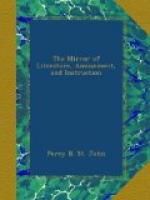“I am going to attend the circuit court; but
my feet have failed me on the road.” And
observing a pony in the farm-yard, he said, “That’s
a bit nice pony of yours;—is it to sell?—would
you like to part with it?” “A wad’
na’ care,” Wull says; “but ma brother
Geordy, he’s the farmer; and he’s at Selkirk
the day. But if we could get a guid price for’t,
a daresay we might part wi’t.” “What
do you ask for it?” says the stranger.
“Ma brother,” quoth Wull. “says it’s
a thing we hae nae use for, and if we could get ought
of a wiselike price for’t, it would be as well
to let it gang.” There were only two words
to the bargain; the gentleman and Wull agreed.
Says the gentleman, “By the way, I cannot pay
you to-night; but if you have any hesitation about
me, my name is Henry Brougham, and I refer you to
the Earl of Buchan, or Mr. George Currie, of Greenhead,
who will satisfy you.” It will be observed
that the places of residence of this nobleman, and
Henry’s brother advocate, Mr. Currie, were in
the neighbourhood. On this reference, without
making any inquiry, honest, Wull immediately gave the
gentleman the pony, with the necessary trappings.
Wull being a man of orderly habits, went early to
bed; and next morning, when the business of the farm
called him and Geordy together, says Wull to Geordy,
“Ye was unco late in coming hame last night;
aw salt the powny.” “And wha did you
sell it to?” “Oh, to a young gentleman.”
“And what did you get for’t?” Wull
having mentioned the price—“My faith,”
says Geordy, “ye hae selt it weel.”
“But,” says Wull, “a did na’
get the siller.” “You d—d
idiot, ye did na’ gie away the powny without
getting the siller for’t; wha was he?”
“Oh, he ca’d himsel’ Henry Brougham,
and he said if a had ony jealousin’ about him,
that the Earl of Buchan, or George Currie, advocate,
Greenhead, would say he was guid enough for the money.
On, he was an honest-looking lad; a could hae trusted
ony thing in his hand.” Geordy’s
temper became quite ungovernable at Wull’s simplicity.
After the whole southern circuit was finished, there
was no word of payment, and Wull’s life became
quite miserable at Geordy’s incessant grumbling
and taunting; the latter ever and anon repeating, “What
a d—d idiot Wull was to gie the beest without
the money till a man he kend naething about;”
and the other as pertinaciously insisting, “that
he (the gentleman) was an honest-looking man, there
was nae fear o’ him.” In the course
of six weeks an order came for the payment of the steed.
“L—d,” says Wull, “did
na I tell ye he was an honest man, a kend by the look
o’ him.” From that moment Wull stood
eminently high in Geordy’s eyes; and while the
one chuckled at his penetration of character, the other
was no less humbled at having called his superior
judgment in question. William Hall is still alive,
and there is not a prouder man in Britain’s Isle
than he is when he relates the little incident in his
life, of which the present Lord Chancellor of Great
Britain forms the hero.—Schoolmaster.




